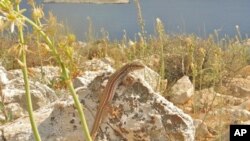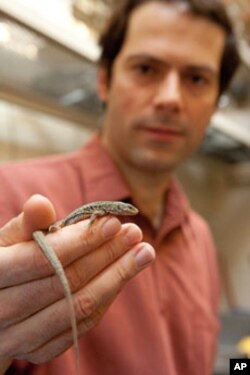Scientists are exploring the earth's ancient past for clues to how species today might respond to a warming climate and a landscape that's breaking apart.
Results of the new study suggest many species will be lost as conditions worsen - and the species which will disappear first are those that are intolerant of northern heat.
University of Michigan ecologist Johannes Foufopoulos looked at conditions in Greece 15,000 years ago at the end of the last Ice Age, when scores of islands formed.
"They became isolated as sea level rose," he says. "Essentially we have a system in which we have a natural process of habitat fragmentation, not by humans, but by rising sea levels."
Foufopoulos and his colleagues studied the extinction rates for 35 reptile species on 87 islands in the northeast Mediterranean Sea. He says comparing historic fossil records with present day distribution, the researchers were able to tell which species perished and when.
"What we find is that islands today harbor many, many, many fewer species than the neighboring mainland. So we infer basically that species that used to be there have gone extinct." Northern-dwelling species that requireed cool and moist conditions didn't tolerate heat very well," he adds. "These were also disproportionally quick to disappear."
In most cases reptiles disappeared on the smallest islands first, places where the habitat choices were most limited. Foufopoulos says the study provides clues to how wildlife today might respond to climate shifts and a landscape fragmented by roads and farms and buildings. "The unfortunate observation, the lessons here is that it is going to be pretty bad."
Foufopoulos says the study is more than a look back in time. It also underscores the need to conserve land for species migration, either by setting it aside or by creating wildlife corridors that can help animals adapt as conditions change.
"We absolutely need these species in order to survive because we depend on natural ecosystems to obtain our water, our food, our clean air. These services are being provided by natural species communities. We don't think about it, but our crops are pollinated by bees, for example. If we lose those bees because of degraded habitat and we've changed the climate, we won't be able to have crops."
The study appears in the January edition of American Naturalist.





